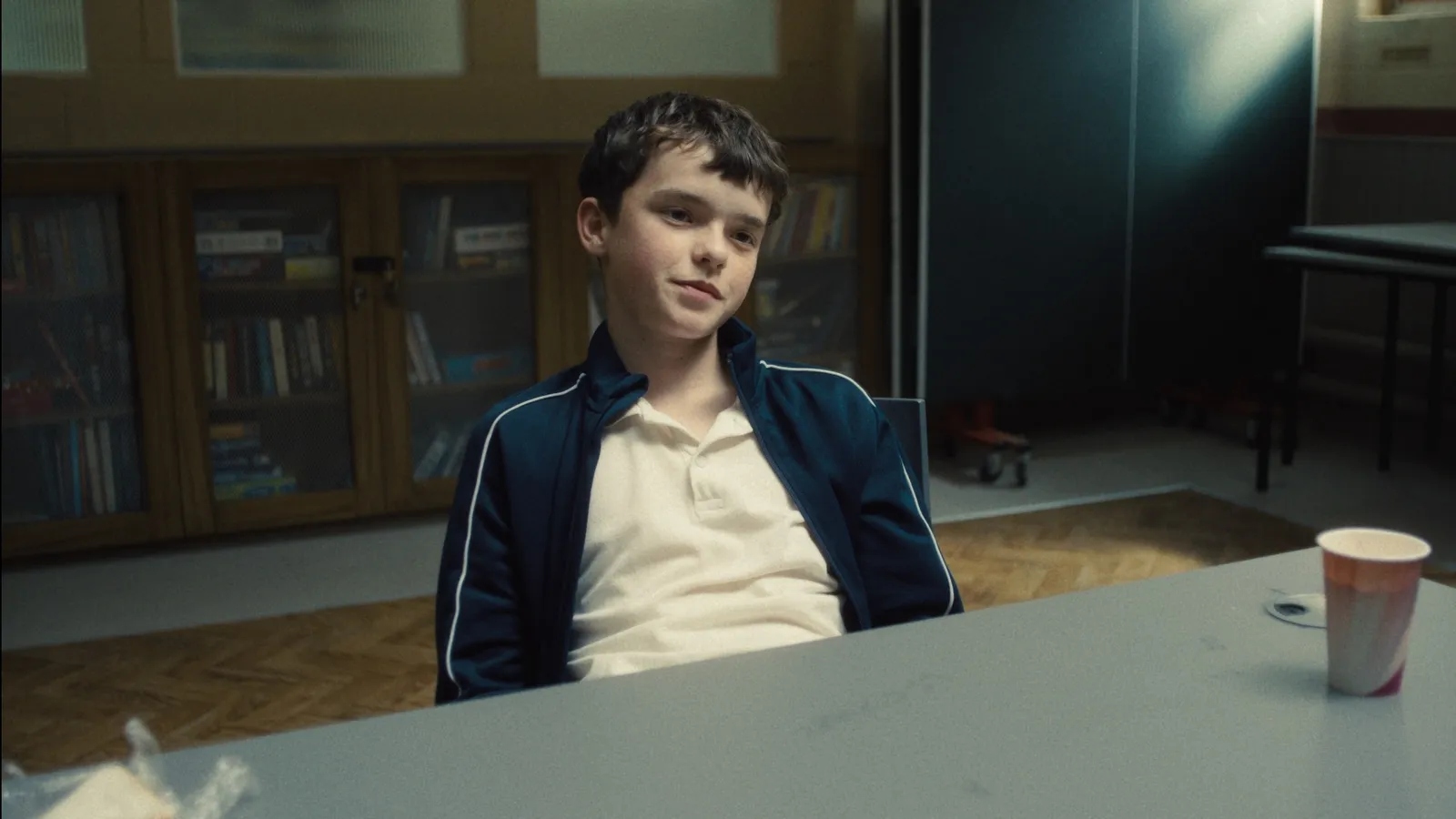Concerned about Netflix’s Adolescence? You’re not alone - here’s how I approached toxic masculinity with my son
Plus three mums share their experience


Since psychological crime drama Adolescence was released on Netflix, conversations the show has sparked are still not slowing down.
They're set to continue, now the show has been nominated for several categories at the National Television Awards, and is expected to take many awards home.
The series tells the tale of a schoolgirl stabbed to death by a 13-year-old classmate, highlighting the ever-growing issue of online safety and the toxic world of misogyny.
In an interview on BBC Sounds, Jack Thorne, writer of Adolescence, said of his tween son, "He’s still beautiful and sweet and wonderful, and I’m terrified of what’s going to happen to him over the next few years. I’m terrified of how to deal with the whole question of phones."
Jack’s words will resonate with parents of boys, who often see their sons transform from kind, loving kids to sullen, combative teenagers struggling to understand the world around them.
We had that too, growing up, but the difference between Gen X and Millennial parents and our Gen Z/Alpha kids is that they have access to information we didn’t – namely, the internet and social media – and this has changed the landscape for everyone.
As I became more aware of toxic masculinity and incel groups, I found ways to broach these concerns with my son (I also read Caitlin Moran’s book, What About Men?, which I highly recommend).
Sign up to our free daily email for the latest royal and entertainment news, interesting opinion, expert advice on styling and beauty trends, and no-nonsense guides to the health and wellness questions you want answered.
It’s not always easy having a conversation of any sort with teenagers – let alone a serious one – but persevering pays dividends. And with the help experts, I worked out ways to help my son build confidence, respect, and emotional intelligence. Here's how I approach toxic masculinity with my son.
1. Review his relationship with women
My son feels relaxed with females he’s grown up with but shy talking to girls at school, so I remind him that these girls feel insecure, too.
It’s worth being aware "boys with low self-esteem and poor social skills, who don’t have healthy friendships and relationships with girls, may be vulnerable to indoctrination by toxic influencers," says Alicia Drummond, the founder of Teen Tips and The Wellbeing Hub. "So, if your child lacks confidence, keep an eye out'. Mixed-sex after-school activities may help."
2. Don’t accept (or use) disrespectful language
My son once asked if it’s ok to call women bitches. No stars for guessing what my reply was. I explained why it’s degrading, even when used jokingly, but I’ve also stopped using negative language in front of him (such as a 'dickhead’ remark when a driver cuts me up).
Phil Mitchell, a senior accredited therapist specialising in working with male victims of abuse, advises, "If any child – boy or girl – expresses derogatory views about the opposite sex, this should be explored and discussed along with how young people see themselves."
3. Pay attention to who he follows online
I respect my child’s privacy but, as things currently stand, I think it’s reasonable to ask to scroll through their social media accounts, if they have them (and you know about them).
"Ask 'Who are you following? What ideas do they have? What do you think about those ideas? What would you do if you saw something that you found upsetting?'" says Alicia.
If you see or hear anything alarming don’t panic or get angry – they might retreat. The same goes for posts your son shares – check comments for cyberbullying and become familiar with sexual and manosphere-related emoji slang.
4. Compliment him, and others
A quote that's always stuck with me is, "If you don’t have something good to say about someone, don’t say anything". Since I’ve starting talking more positively, my son has responded well.
I tell him his dad’s a great cook/supportive boss, and we say it’s ok to be fed up, angry, sad, upset, and that we love when he's kind, funny and caring. The more your child hears positive, enthusiastic words, the more they’ll adhere to them.
5. Ask questions
If my son says something 'bad' and I say, "You can't say that!" he gets embarrassed that he got it wrong. Now I say, "Why do you think that?" By posing it as a question, he has time to consider whether it was demeaning.
6. Lose the lectures
This can cause kids to become defensive and shut down. Alicia suggests, "Rather than criticising, try to get them thinking. You might say things like, 'Do you think your views about women are ok?' or 'How do you think you’d feel if someone treated your little sister/cousin/mother like that?'" This can help our sons question relationships, without it sounding like an attack.
7. Ask how he feels about himself
When my son belittles himself, I say he's funny/bright/kind/helpful, and give examples so he's more likely to believe it.
If your son's become worried about how he looks or how much he weighs, or he’s putting himself down in terms of 'traditional masculinity', this could be a red flag, warns Phil. Keep an eye on how your son talks about himself, as well as his diet, exercise levels and requests for protein powders or energy drinks.
8. Avoid inflammatory terms
Toxic masculinity can seem accusatory to young boys. "Parents need to focus less on masculinity being a problem and more on masculinity being a healthy, natural expression in many boys and young men," says Phil.
In an interview shown on Instagram, Ashley Walters, who plays DI Bascombe in Adolescence, explains how just as the Andrew Tates of this world can influence young men, we can influence them too "by continually bombarding them with positive messages and letting them understand that to be vulnerable, to cry, to talk to people about how you feel, to be in places in women spaces and be cool – there’s nothing wrong with that."
9. Speak openly and honestly
It’s important to discuss negative messages my son sees, even if it’s uncomfortable. "If we don’t, we won’t give children an alternative perspective or narrative for what they’re seeing, and without an alternative narrative, why wouldn’t they believe that what they’re watching is what they should be doing?" says Alicia.
10. Cut him some slack
Kids make mistakes. They do things they don’t mean or say things they regret, and they test boundaries or act out because they’ve been hurt, or they’re in pain. Shift the focus from their attitude or beliefs, to that pain.
What other parents say: 3 mums share their experience
Nicole, London
"The toxicity reared up and bit us hard during the rise of Andrew Tate. My son is dyslexic and was struggling to adapt to year 7 – truly a jungle for a lot of youngsters, a lot of vying for power and trying to adapt trying to win respect. So, when Andrew Tate began to give vulnerable (and not so vulnerable) boys a way of 'winning' they were ready and listening.
"There was a noticeable change in my son’s language and attitude. This became arguments and fighting with his sister. She's a determined person who's used to being able to direct the relationship with her little brother. This changed – not entirely a bad or unnatural thing – but I think it was accelerated by Andrew Tate and his ilk.
"The language used between the two of them and the levels of aggression were troubling. My son had at his disposal an arsenal of language and ideas to belittle his sister and mock females. Refereeing between my son and daughter was extremely difficult. I think it was damaging in the short-term but has perhaps built a new level of understanding between them.
"I think many young men are confused by the gender conversations today – it's hard to negotiate successfully and can easily polarise. Masculinity has also undergone many attacks from a widening base, and I think that young men want to reclaim a sense of pride in being male. Negotiating these shifting sands is difficult for anyone, let alone when you’re young and have little context and life experience.
"My advice? Don’t accept disrespectful language or behaviour at any time. Push back and clamp down immediately. Get involved – watch Andrew Tate to understand. This was really important, to be able to hold an informed and balanced discussion with my son, to not be ignorant when I ask him not to be! Know your subject, be open-minded, don't panic, and believe in your son."
Lisa, Yorkshire
"I think there’s been a rise in toxic masculinity because of shifting gender roles, a backlash to the Me Too Movement which has given the likes of Andrew Tate a platform, and accessibility of online porn and the dominance and violence towards women that content contains.
"Signs can hard to pinpoint as everyone experiences things differently, but from what I’ve seen, higher levels of anger and frustration and/or a change in mood such as depression or anxiety could be signs of toxic masculinity, as well as an inability to express emotions and a suppression of who they are.
"My son is gay and while his family and female friends know, he’s not shared this with his school friends because, I believe, homophobia is rife in teenage boys and he doesn’t want to become a target.
"I’ve talked to my son about the importance of consent since he was little – ask, don’t take, and never assume. I frequently talk to him about the fear all women feel walking through a dimly-lit park, so he understands that the threat of physical and sexual assault is something we’re forced to live with. And when he was old enough to understand, I talked to him about porn to mitigate his perception of what he's watching.
"I warned him that it’s not representative of real sex. I also make him do chores to counteract expectations that I should do it because I’m a woman. Fortunately, he sees my partner do (almost!) as much cooking and cleaning as me, which rejects the notion that it’s 'women’s work'.
"If parents are concerned, don’t ignore it but don’t try to force an answer. Let your kid feel like they can trust you, let them feel safe. There’ll always be things they won’t want to talk about, but a safe environment helps. I always encourage him to speak to me about how he’s feeling. which he often does, and he sees a counsellor at school who helps him find ways to express his emotions in a healthy way."
Hannah, London
"Smartphones have given younger teens access to the internet and ways of finding out things without their parents knowing. Lockdown cemented this. I noticed, when my son was 14, he began to talk about the ideal male face and body. He then started to show me pictures of impossibly muscular individuals with huge jawlines that he’d found online.
"I contradicted it, telling him that women don’t like that type of man, but he told me that I was old and didn’t know. His self-esteem plummeted and he started to dislike himself. We found that he’d tried to buy growth hormones online. With him, it was all about how he saw himself as lacking.
"I would look out for negative self-talk beyond the usual, and specific stuff about different body parts not being up to the perceived ideal. Luckily, we had open lines of communication, but he wasn’t open to critiquing these ideas.
"Because he saw us as old and the internet as representative of his generation, it was very difficult to break through. But we kept saying what we thought, calmly suggesting he think about what the motivation is for people to put these things out there.
"It’s a long game that parents have to play, and I think a lot is about brain development and how they need to think differently to you. When they’re ready, they’ll begin to see other perspectives. BEAT, an eating disorder charity (as he began to restrict food) were helpful. I spoke to his uncle and his cousin in his 20s who’d also experienced this sort of online material and he was able to give us some context."
Where to find help
If you’re worried about your child’s mental health, you can contact your GP about a referral to CAMHS, or visit the BACP website and search for ‘teenager’ to find an appropriate therapist online or in your area.
You can also visit The Wellbeing Hub, Young Minds , Mind and Place2Be for more advice, information and support.
Debra Waters is an experienced online editor and lifestyle writer with a focus on health, wellbeing, food and parenting. Currently, she writes for Woman&Home, NOON, and Psychology Now. Previously, Debra was digital food editor at delicious magazine and MSN. She’s written for Everyday Health, Great British Chefs, loveFOOD, M&S Food, Time Out, The Big Issue, The Telegraph, What to Expect, Woman and Woman’s Own. Debra is also an essayist and short story writer.
